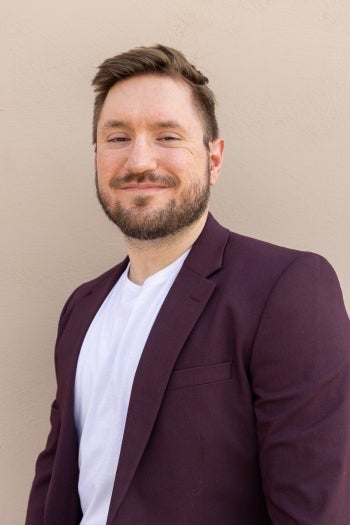Editor’s note: This story is part of a series of profiles of notable spring 2023 graduates.
College can be extremely challenging, even for students in families steeped in higher education. For a family who has never experienced college, even getting their arms around the nomenclature can be a struggle.
“My folks didn’t know what ‘undergrad’ meant,” said Marcus Stafford, “let alone ‘bachelor’s’ or ‘associate’ degrees. It was a learning process for all of us.”
The California native initially went to community college for one year before applying at ASU. Upon acceptance, he continued to knock out his general education requirements before selecting his first of four majors (geographic information science, geography, history and anthropology).
This May, he graduates as the Dean’s Medalist for Arizona State University’s School of Geographical Sciences and Urban Planning.
Question: What was your “aha” moment when you realized you wanted to study the field you majored in?
Answer: I grew up in a family that, for many of us, had little means of transportation. Public infrastructure, such as government services, public buses or community centers were lacking. Both with members of my family, and where I grew up.
I grew up in a rural area when I moved to Arizona, and with no car, this severely limited my opportunities for education, work or a social life. My family had difficulties in affording cars and reliable transportation.
In entering SGSUP, I realized that I could turn my attention towards urban planning and GIS-related work that could impact people. I realize the lack of access to public infrastructure can do, and how much it matters in people's lives, as I lived it on my own.
Q: What’s something you learned while at ASU — in the classroom or otherwise — that surprised you or changed your perspective?
A: How many different aspects of thought can be brought into problem-solving. There can be perspectives from people who study business, engineering, statistics, law and history, who all can contribute to a project or idea in unique ways.
Q: Why did you choose ASU?
A: I chose ASU because of the opportunity that they gave me. My grades in high school were never great, so I was always going to be limited in the colleges who would accept me and give me that opportunity. However, ASU did.
They welcomed me and gave me every opportunity to succeed. All that I had to do was put in the effort, get help when I needed it, and believe in myself. Every bit of help that I gained from ASU went into my success, because there's no way that I could have done it on my own.
Q: Which professor taught you the most important lesson while at ASU?
A: Dr. (Wen-Ching) Chuang from SGSUP made me understand that the process of problem-solving is going to be complicated, messy and difficult. However, the key is persevering through the issues. In my major in GIS, I tackled many projects that were, plainly, frustrating. Data that was difficult to work with or results that were not what I expected. She gave me encouragement, and the advice, and the context of what I was doing, to give me the fortitude to keep moving through any issue that I had.
Q: What’s the best piece of advice you’d give to those still in school?
A: Take time for yourself. Eat something, hydrate, go to the gym, have a hobby that is completely outside of school. You need to take care of yourself first before you can take care of and complete your coursework.
Q: What was your favorite spot on campus, whether for studying, meeting friends or just thinking about life?
A: While I was an online student, I was on ASU's campus here and there. My favorite spot is the Nobel Library. It had good vibes. Outside, I would choose the ASU Herb Garden, between the Moeur Building and the Interdisciplinary A building. It's usually quiet over there, and there's lots of tree cover.
Q: What are your plans after graduation?
A: I will be attending graduate school at UCLA in the fall of this year.
Q: If someone gave you $40 million to solve one problem on our planet, what would you tackle?
A: While $40 million couldn't solve a single problem, I do believe that it could be used to help a portion of the planet. I think public infrastructure would be a wise investment, as that is an investment into a community which has long-term impacts long after the project would be completed. One could do a project on water or sewage systems in developing countries.
Stafford and all the Dean’s Medal winners will be formally recognized during The College of Liberal Arts and Sciences convocation.
More Sun Devil community

Barrett program unlocks study abroad for first-year honors students
Twenty first-year students from Barrett, The Honors College at Arizona State University are spending their second semester…

A champion's gift: Donation from former Sun Devil helps renovate softball stadium
Jackie Vasquez-Lapan can hear the words today as clearly as she did 17 years ago.In 2008, Vasquez-Lapan was an outfielder on…

Student-led business organization celebrates community, Indigenous heritage
ASU has seen significant growth in Native American student enrollment in recent years. And yet, Native American students make up…


